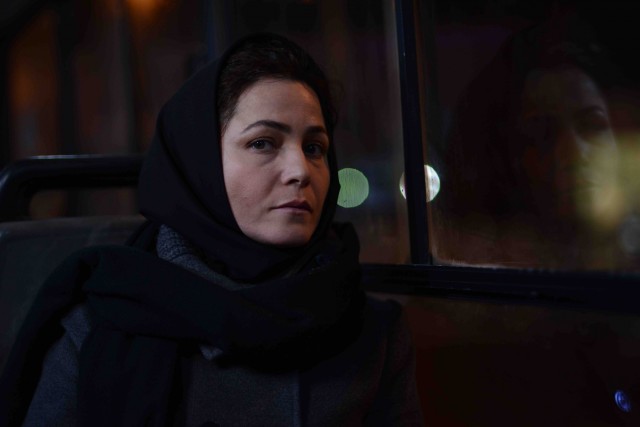Any aficionado of Iranian shorts will already be familiar with Farnoosh Samadi’s pen. A prolific screenwriter of short films, which have been selected at some of the most prestigious film festivals worldwide, her continued collaboration with writer/director Ali Asgari has brought us many gems, including previously featured The Baby. Returning to the role of director for a second time, after co-directing award-winning short Il Silenzio (The Silence) with Asgari, Samadi presents another character-driven, engaging narrative in her 14-minute short Negah (Gaze).
Based around a simple narrative, involving a mundane yet morally complex situation that effortlessly feels universal, with Gaze we instantly get that distinct realism that is so characteristic of contemporary Iranian cinema. With Samadi’s narrative following a woman on her way home after a long day at work, we’re instantly on edge, as we know public transportation is not the safest place for a woman (short films Laps and Work have both confirmed this – if we didn’t already know!).

Set on public transport, Gaze instantly puts its audience on edge
When our tired commuter witnesses a crime on her journey, she’s now faced with a dilemma – should she speak out or mind her own business? What could happen to her if she reports what she saw? Featuring an extremely relatable narrative, Samadi and her team succeed at putting the audience in her main character’s shoes and ultimately, as viewers, we feel as if we’re faced with exactly the same predicament and asked what would you do in her shoes?
“I made this film to start a conscious struggle in the mind of the audience”
Citing personal experience as a source of inspiration for her story, which she co-wrote with Asgari, Samadi admits she wanted to confront a female main character with this type of event and use her film to follow her train of thought. “I made this film to start a conscious struggle in the mind of the audience”, the writer/director explains. “Should we tell the truth and accept its consequences, or we could turn a blind eye to all faults and flaws and live an easy life?”. With its easily relatable lead character, Gaze amplifies the empathy of the audience and pushes their engagement to the next level, by forcing us to think about how we would respond in the same situation.

What would you do in the same situation? Speak out or keep quiet?
Not a lot is said in Samadi’s short, but it is not the dialogue that moves the plot forward. Driven by a compelling lead performance by Marzieh Vafamehr, Gaze instils a subtle, escalating tension, quickly gripping its audience and masterfully taking control of their breathing pattern. As the film’s protagonists witnesses the crime on the bus we feel her hesitation to speak out, almost as if it were our own. Then later as she begins to fear for her safety and she makes a fearful dash for home, the growing sense of threat she feels is extremely contagious.
The camera in Gaze, controlled by cinematographer Ashkan Ashkani, sticks tightly to its main character and along with Vafamehr’s layered performance, the film succeeds in its aims to place us alongside her, anxious for her to get home safe and sound. Between Vafamehr’s facial expressions, the movements of the camera and the sound of that moped, the tension creeps under your skin until the climax. Samadi does grant her audience a grace period to start recovering emotionally, but when the credits roll, the audience will undoubtedly be left shaken by the experience.
With a premiere at Locarno in 2017 and notable stops at Palm Springs and Regard in 2018, as expected, Gaze had a very successful festival run. Samadi’s follow up, The Role, is equally impressive and should hopefully be available online soon. Fresh from its premiere in the Discovery section of TIFF, her debut feature 180 Degree Rule is now beginning its festival run (playing London Film Festival at the moment) at the same time as Witness, the new short by Asgari that – you guessed it – Samadi co-wrote.

 Céline Roustan
Céline Roustan